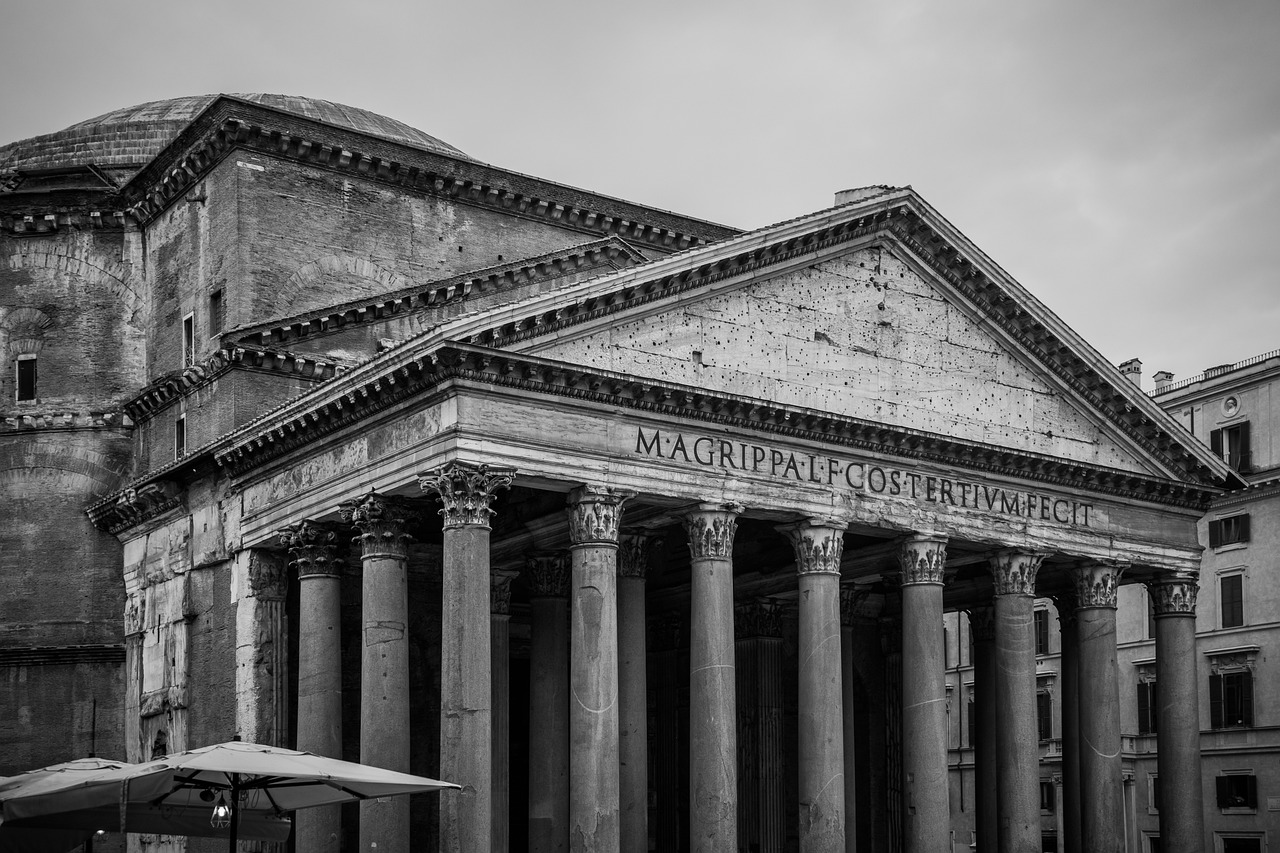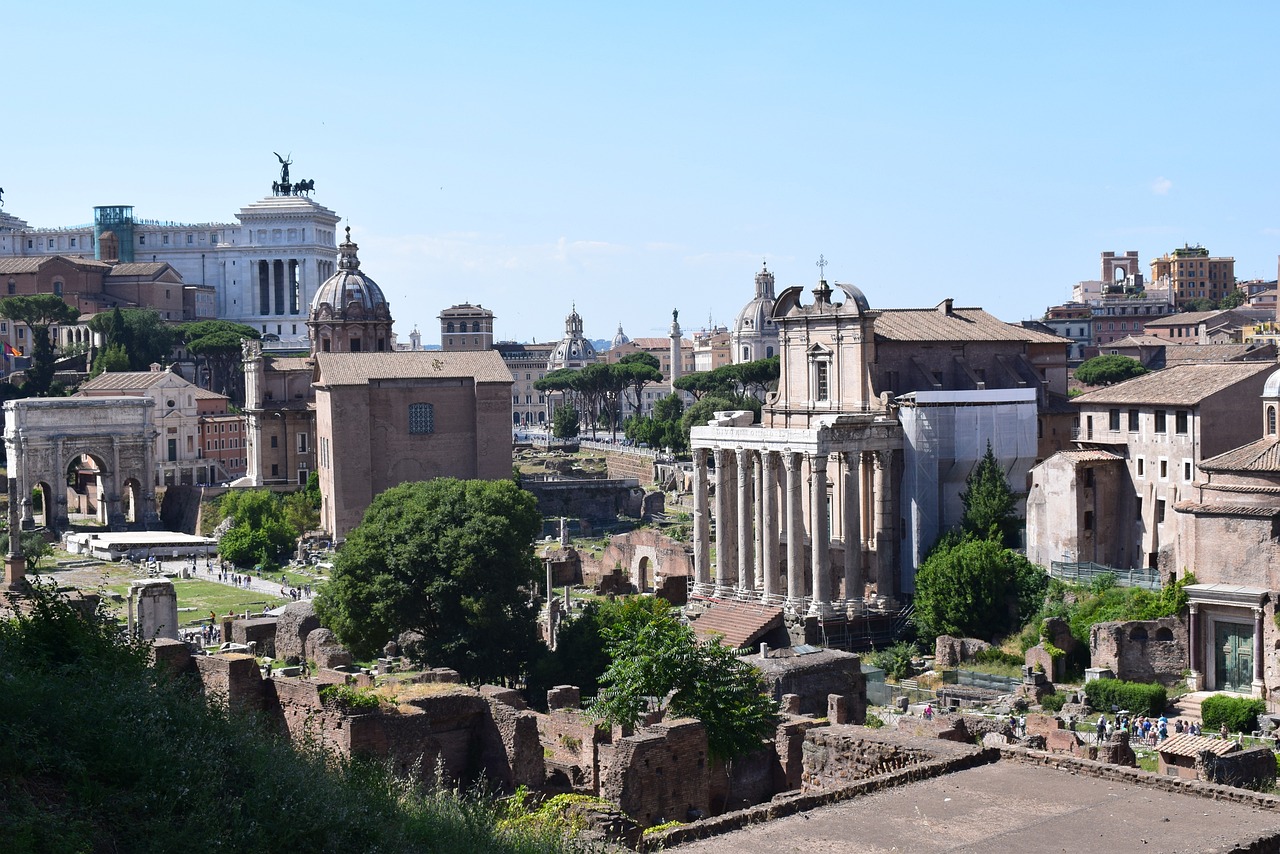The Influence of Ancient Rome on Western Legal Systems
When delving into the intricate tapestry of Western legal systems, one cannot overlook the profound influence that Ancient Rome has had on shaping the legal landscape we navigate today. The echoes of Roman legal principles and practices reverberate through time, leaving an indelible mark on the development and evolution of modern legal frameworks.
At the heart of this influence lies the development of legal codes in Ancient Rome, most notably exemplified by the Twelve Tables and the Corpus Juris Civilis. These foundational documents laid the groundwork for legal systems in the Western world, setting a precedent for codified laws and principles that continue to resonate in contemporary jurisprudence.
The adoption of Roman legal concepts, such as the rule of law and the roles of judges and lawyers, has seamlessly integrated into the fabric of Western law. The legacy of Roman legal philosophy, championed by luminaries like Cicero and Ulpian, continues to shape modern jurisprudence, infusing it with enduring principles of justice and equity.
Moreover, the continuity of Roman legal principles in modern legal systems underscores the timelessness of concepts like equality before the law, property rights, and contractual obligations. These pillars of Roman law remain steadfast in guiding legal interpretations and decisions in today's complex legal terrain.
As we navigate the intricate web of constitutional law, the influence of Roman legal concepts on governance, citizenship, and constitutionalism becomes apparent. Western democracies, including the United States and European nations, have drawn upon Roman legal heritage to sculpt their constitutional frameworks, ensuring the protection of individual rights and the rule of law.
The impact of Roman legal institutions, such as the praetor and the Senate, reverberates through the corridors of judicial systems in Western countries. These institutions have played a pivotal role in upholding justice and accountability, shaping the very foundation of modern judicial processes.
Furthermore, the adaptation of Roman legal precedents in common law systems, particularly in the United Kingdom and the United States, has enriched the tapestry of legal interpretation and decision-making. The incorporation of Roman case law has provided a robust framework for judicial reasoning and legal analysis.
Lastly, the legacy of Roman legal heritage extends its reach into the realm of international law, influencing the principles of jus gentium and jus cogens. These foundational concepts have paved the way for the development of international legal norms and treaties, shaping the course of global governance and diplomacy.

Development of Legal Codes in Ancient Rome
Ancient Rome was a pioneer in the development of legal codes that laid the foundation for modern Western legal systems. One of the most significant contributions was the creation of the Twelve Tables, a set of laws inscribed on bronze tablets that established key principles of justice and governance. These laws covered various aspects of Roman society, including property rights, family law, and criminal offenses, providing a framework for resolving disputes and maintaining order.
Another milestone in Roman legal history was the Corpus Juris Civilis, compiled under the reign of Emperor Justinian in the 6th century AD. This comprehensive collection of Roman laws, edicts, and legal writings formed the basis of civil law in many European countries and influenced the development of legal systems across the Western world. The Corpus Juris Civilis preserved and codified Roman legal principles, ensuring their continuity and relevance for centuries to come.
The evolution of legal codes in Ancient Rome reflected the society's commitment to justice, fairness, and the rule of law. By codifying and systematizing legal norms, the Romans established a framework for resolving conflicts and upholding the rights of individuals within a structured legal system. The legacy of Roman legal codes continues to shape modern legal practices and institutions, emphasizing the importance of clear laws and consistent application of justice.

Adoption of Roman Legal Concepts in Western Law
When exploring the adoption of Roman legal concepts in Western law, it becomes evident that the influence of Ancient Rome has been profound and far-reaching. The legal principles and practices established in Ancient Rome have laid the foundation for many aspects of modern Western legal systems. Concepts such as the rule of law, legal institutions, and the roles of judges and lawyers have been integrated into the fabric of Western legal frameworks, shaping the way justice is administered and laws are interpreted.
One key aspect of Roman legal concepts that has been widely adopted in Western law is the idea of equality before the law. In Ancient Rome, all citizens were considered equal in the eyes of the law, regardless of their social status or wealth. This principle of equality has been enshrined in modern legal systems, ensuring that justice is impartial and fair for all individuals.
Moreover, the Roman emphasis on property rights and contracts has also had a lasting impact on Western legal systems. The concept of property rights, which guarantees individuals the right to own and control their possessions, is a fundamental aspect of modern legal frameworks. Similarly, the Roman understanding of contracts as legally binding agreements has been integrated into Western law, providing a framework for enforcing agreements and resolving disputes.
Additionally, the role of judges and lawyers in Ancient Rome has influenced the development of legal institutions in Western societies. The Roman tradition of legal advocacy and the importance placed on legal expertise have shaped the way legal systems operate in Western countries. The professionalization of legal practice and the establishment of judicial systems can be traced back to Roman legal concepts, highlighting the enduring legacy of Ancient Rome in the field of law.

Influence of Roman Legal Philosophy on Jurisprudence
Roman legal philosophy has had a profound impact on the development of jurisprudence in Western legal systems. The contributions of renowned Roman legal thinkers such as Cicero and Ulpian have left a lasting legacy in shaping the principles and theories that underpin modern legal thought. Their insights into the nature of justice, the role of law in society, and the rights of individuals have influenced the way legal scholars and practitioners approach legal issues and interpret laws.
One of the key aspects of Roman legal philosophy that has resonated through the centuries is the emphasis on the rule of law and the importance of legal institutions in upholding justice. The concept of a legal system based on established laws and procedures, rather than arbitrary decisions, is a cornerstone of modern jurisprudence. Roman thinkers recognized the need for a fair and impartial legal system that protects the rights of all individuals, regardless of their status or background.
Furthermore, Roman legal philosophy laid the groundwork for the development of legal principles such as equality before the law, due process, and the presumption of innocence. These principles continue to form the basis of legal systems in Western countries, ensuring that individuals are treated fairly and justly under the law. The idea that all individuals are equal in the eyes of the law, and that legal decisions should be based on objective evidence and reasoning, stems from the teachings of Roman legal philosophers.
In addition to shaping the theoretical foundations of jurisprudence, Roman legal philosophy has also influenced the practical aspects of legal practice. The role of judges and lawyers in interpreting and applying the law, as well as the importance of legal precedent and reasoning in judicial decision-making, can be traced back to Roman legal traditions. The legacy of Roman legal philosophy is evident in the way legal professionals approach cases, analyze legal issues, and advocate for their clients in modern legal systems.

Continuity of Roman Legal Principles in Modern Legal Systems
When we look at modern legal systems in Western societies, it becomes evident that the influence of Ancient Rome is deeply ingrained in their foundation. The continuity of Roman legal principles has transcended centuries, shaping the way laws are structured and justice is administered in today's legal landscape.
One of the key Roman legal principles that continue to hold significance in modern legal systems is the concept of equality before the law. In Ancient Rome, all individuals were considered equal in the eyes of the law, regardless of their social status. This principle has been carried forward into contemporary legal frameworks, emphasizing the importance of impartiality and fairness in legal proceedings.
Property rights, another fundamental aspect of Roman law, have also left a lasting impact on modern legal systems. The concept of ownership and the protection of property rights were central to Roman legal philosophy and are enshrined in the property laws of many Western countries today. These principles provide individuals with the security and legal recourse to safeguard their assets.
Contracts, a cornerstone of Roman legal practice, have continued to play a vital role in shaping modern contract law. The meticulous approach to drafting and enforcing contracts in Ancient Rome set a precedent for the meticulousness and precision required in contractual agreements in contemporary legal systems. This ensures that parties are bound by their obligations and that contractual disputes can be resolved effectively.
Furthermore, the Roman emphasis on the rule of law as a foundation for society has permeated modern legal systems, emphasizing the importance of adherence to established laws and regulations. This commitment to the rule of law ensures stability, predictability, and accountability in legal processes, fostering trust in the judicial system.
In conclusion, the continuity of Roman legal principles in modern legal systems underscores the enduring legacy of Ancient Rome in shaping the foundations of Western law. By upholding principles such as equality before the law, property rights, and the rule of law, contemporary legal systems continue to reflect the influence of Roman legal thought and philosophy.

Role of Roman Law in Shaping Constitutional Law
When examining the role of Roman law in shaping constitutional law, it becomes evident that the influence of Ancient Rome extends far beyond just legal principles. The concepts of constitutionalism, citizenship, and governance that were foundational in Roman legal thought have significantly impacted the development of constitutional law in Western democracies. The United States and various European countries, in particular, have drawn upon Roman legal concepts to establish their constitutional frameworks, emphasizing the importance of written laws, separation of powers, and the protection of individual rights.
One of the key contributions of Roman law to constitutional development lies in the establishment of the principle of constitutionalism. The Romans believed in the supremacy of the law over rulers, laying the groundwork for the idea that governmental authority should be limited by a set of fundamental laws. This notion of a constitution as the highest legal authority has been integral to the evolution of constitutional law in Western societies, ensuring that governments are bound by a framework of rules and regulations that safeguard the rights of citizens.
Furthermore, the concept of citizenship, as defined by Roman law, has played a crucial role in shaping modern constitutional systems. In Ancient Rome, citizenship conferred both rights and responsibilities upon individuals, emphasizing the idea of civic duty and participation in the governance of the state. This notion of citizenship as a reciprocal relationship between the individual and the state has been reflected in contemporary constitutional law, where citizens are granted certain rights in exchange for fulfilling their obligations to society.
Moreover, the Roman emphasis on the separation of powers and the role of governance institutions has left a lasting impact on constitutional law. The Roman Senate, for example, served as a deliberative body responsible for overseeing the actions of magistrates and ensuring the proper functioning of the government. This model of institutional checks and balances has been adopted in modern constitutional systems to prevent the concentration of power in any single branch of government, promoting accountability and transparency in decision-making processes.
In conclusion, the role of Roman law in shaping constitutional law cannot be understated. The enduring legacy of Roman legal concepts such as constitutionalism, citizenship, and governance continues to influence the development of constitutional frameworks in Western democracies, providing a historical foundation for the protection of individual rights and the maintenance of a just and equitable society.

Impact of Roman Legal Institutions on Judicial Systems
When examining the impact of Roman legal institutions on judicial systems in Western countries, it becomes evident that the legacy of Ancient Rome continues to shape the structure and function of modern legal systems. The influence of Roman legal institutions such as the praetor, the Senate, and the courts can be seen in the emphasis on justice, accountability, and the rule of law.
The role of the praetor in Ancient Rome, responsible for overseeing legal matters and dispensing justice, has parallels in the modern judicial systems where judges play a crucial role in interpreting and applying the law. Similarly, the Senate's function as a legislative body and a check on executive power has influenced the separation of powers in Western democracies, ensuring a system of checks and balances.
Moreover, the establishment of courts in Ancient Rome to resolve disputes and administer justice has laid the foundation for the judicial systems in Western countries. The concept of due process, fair trials, and the right to legal representation can be traced back to the Roman legal institutions that prioritized the protection of individual rights and the administration of justice.
By studying the impact of Roman legal institutions on judicial systems, we gain a deeper understanding of the historical roots of our legal frameworks and the enduring principles of justice and accountability that continue to guide the practice of law in contemporary societies.

Adaptation of Roman Legal Precedents in Common Law Systems
When examining the adaptation of Roman legal precedents in common law systems, it becomes evident that the influence of ancient Roman law extends far beyond its original context. Common law systems, particularly in countries like the United Kingdom and the United States, have integrated Roman legal principles and precedents into their judicial frameworks. This integration has not only enriched the depth of legal interpretation but has also provided a solid foundation for resolving complex legal issues.
One key aspect of the adaptation of Roman legal precedents in common law systems is the incorporation of case law. By referencing and building upon historical legal cases and decisions, common law judges draw upon the wisdom and reasoning of Roman jurists. This practice of relying on precedent ensures consistency and predictability in legal outcomes, fostering a sense of stability and fairness in the legal system.
Furthermore, the concept of stare decisis, or "to stand by things decided," is a fundamental principle in common law systems that can be traced back to Roman legal traditions. This principle emphasizes the importance of adhering to established legal precedents unless there is a compelling reason to deviate. By upholding precedent, common law systems honor the legacy of Roman legal thought and promote a sense of continuity in legal interpretation.
In addition to case law, common law systems have also embraced Roman legal principles related to property rights, contracts, and civil obligations. These foundational concepts, rooted in Roman law, provide a framework for addressing property disputes, enforcing contractual agreements, and upholding the rights and responsibilities of individuals in society. By incorporating these principles, common law systems benefit from the clarity and coherence of Roman legal reasoning.
Overall, the adaptation of Roman legal precedents in common law systems exemplifies the enduring legacy of ancient legal traditions in shaping contemporary legal practices. By drawing upon the wisdom and insights of Roman jurists, common law systems have enriched their jurisprudence and strengthened the foundation of legal reasoning and decision-making.

Legacy of Roman Legal Heritage in International Law
When examining the legacy of Roman legal heritage in international law, it becomes evident that the influence of ancient Roman legal principles extends far beyond the boundaries of individual states. The concepts of jus gentium and jus cogens, originating from Roman legal philosophy, have significantly shaped the development of international legal norms and treaties.
Jus gentium, often referred to as the "law of nations," represents a set of universal principles that are applicable to all individuals and states, irrespective of their nationality. This concept, rooted in Roman jurisprudence, emphasizes the idea of a common humanity and the existence of fundamental rights that transcend cultural and political differences.
Moreover, the notion of jus cogens, or peremptory norms of international law, finds its origins in Roman legal traditions that recognized certain principles as non-derogable and fundamental to the international legal order. These norms, such as prohibitions against genocide, slavery, and torture, reflect the enduring influence of Roman legal heritage on the development of international legal standards.
Frequently Asked Questions
- What is the significance of Ancient Roman legal principles in modern Western legal systems?
Ancient Roman legal principles have had a profound impact on the development of modern Western legal systems. Concepts such as the rule of law, property rights, and constitutionalism originated in Ancient Rome and continue to shape legal frameworks today.
- How did Roman legal philosophy influence jurisprudence in Western societies?
Roman legal thinkers like Cicero and Ulpian made significant contributions to the development of legal philosophy and jurisprudence. Their ideas on justice, equality, and governance have influenced Western legal thought for centuries.
- What role did Roman legal institutions play in shaping judicial systems in Western countries?
Roman legal institutions such as the praetor and the Senate set precedents for the structure and function of judicial systems in Western countries. These institutions laid the foundation for ensuring justice, accountability, and the rule of law.
- How have Roman legal precedents been integrated into common law systems?
Roman legal precedents and case law have been incorporated into common law systems like those in the United Kingdom and the United States. These precedents continue to influence judicial decision-making and legal interpretation in modern legal practice.
- What is the legacy of Roman legal heritage in the field of international law?
The legacy of Roman legal heritage in international law includes principles such as jus gentium and jus cogens, which have shaped the development of international legal norms and treaties. The influence of Roman legal concepts can be seen in the foundations of modern international law.



















